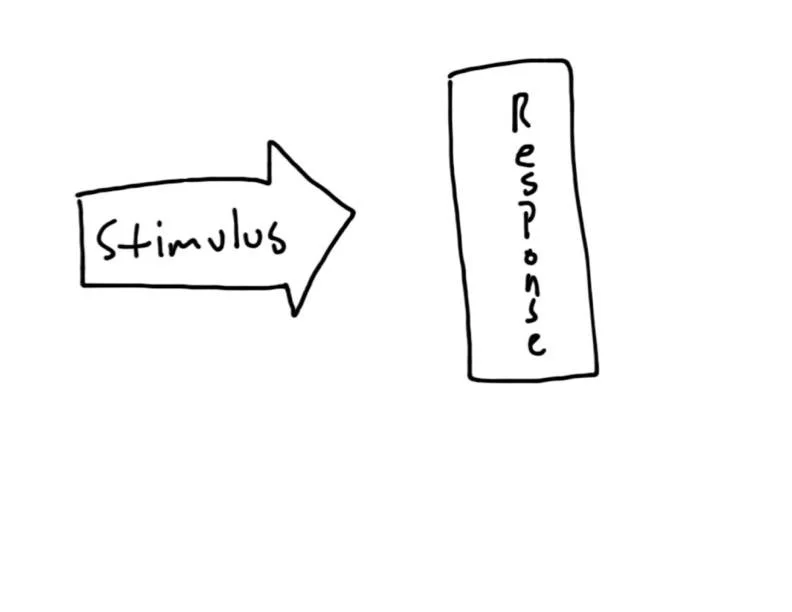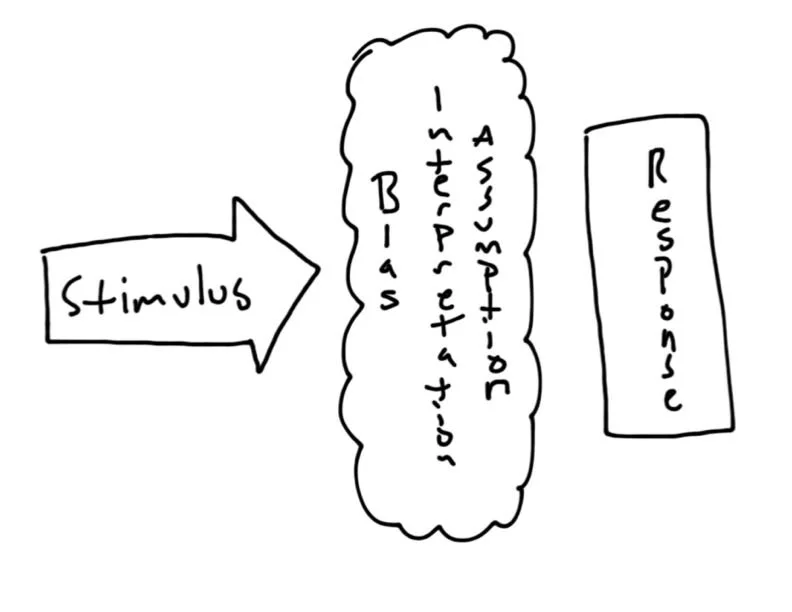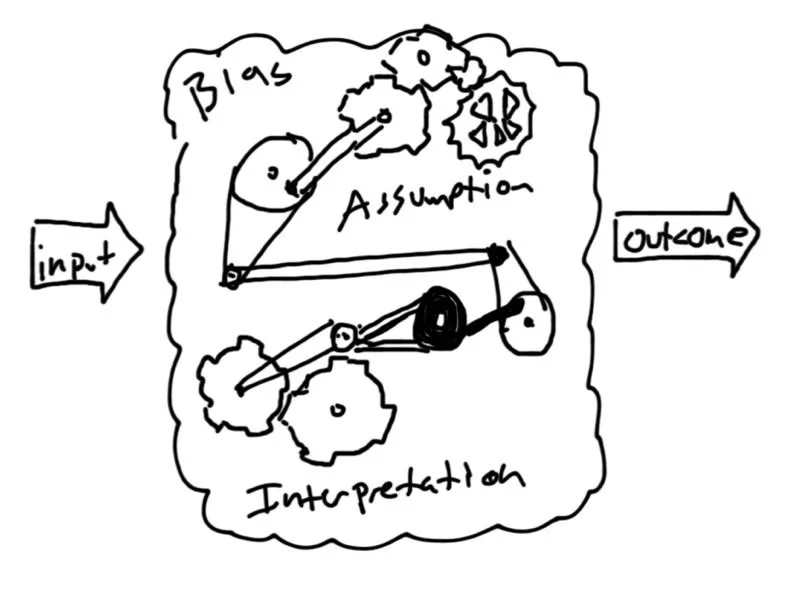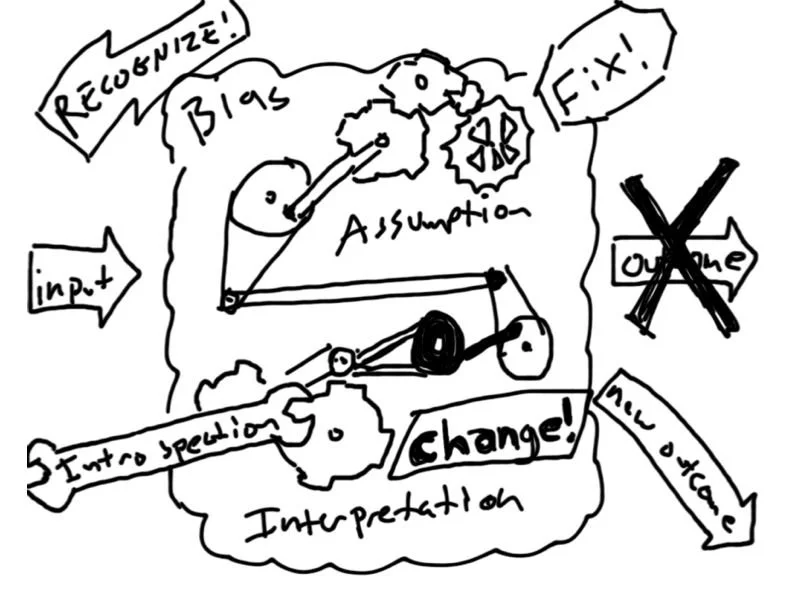Introspection is a Superpower
Note: please pardon the crudeness of these drawings. They were done on an iPad at 2 AM.
What does it mean?
You know what it is to be introspective, right? To be able to analyze your own patterns of thought? A person I admire a lot told me that in his hiring decisions, introspection was the a primary quality he looked for in candidates. I was surprised to hear that, but I think it’s the wisest job requirement I’ve ever heard.
A lot of people see this and conclude that they are largely passengers in life, blown about by the winds of circumstance:
People who see the world this way often have verbal giveaways. “She made me do it.” “He was really pushing my buttons.” “No one listens to me.”
Why give up so much control? Because it’s easy. When life is just reacting to outside forces, we are not responsible for our situation. The boss won’t implement your ideas. Your spouse isn’t supportive enough. You were passed over for a promotion. But it’s not your fault. You’re not responsible for the outcomes, things just happen.
We get the pleasure of being right, but without the burden of having to do anything other than complain when things inevitably go wrong.
Enter introspection.
People who can introspect recognize the fact that their own biases, distortions, and assumptions sit in between actions and consequences, and they have a dramatic influence over our interpretation of reality.
Five people can literally see the same thing and draw five radically different conclusions. The reason is that they each have a complex set of machinery inside their brains that literally alters their reality. How many times have you perceived a slight when there was none? How many times have you been asked “what is that supposed to mean?” when it was supposed to mean exactly what you said? Have you ever remembered something so vividly, only to find out that wasn’t how it happened at all?
Introspection is the work you put in to see your internal machinery for what it is.
What do you do with it?
Being introspective doesn’t necessarily carry any requirement that you act on it, but it makes justifying inaction very difficult.
Here’s an example. Recently, I had an altercation where I got into a tug-of-war with a coworker, and I angrily and passive-aggressively “took my ball and went home”. He was clearly in the wrong. I was right. I was justified. My position was infinitely defensible. Everyone else saw it my way. I won, case closed.
But there it was, gnawing at the back of my mind… what if I wasn’t right? What if I wanted so badly to be right that I was willing to damage relationships to win? (And make no mistake, that’s how it went down.)
Did I apologize? No. Why not? Because shut up, that’s why not. OK, I’m still a bit defensive about it. But the time I took to analyze my actions and position won’t let me get away with this behavior next time. That’s a tiny, broken piece of me that I will fix the next time I encounter a similar situation.
Maybe over time I’ll be able to deal with these situations in real time rather than damaging one relationship to save the next.
The problem is that we all build a thick, protective shell around our internal machinery throughout our lives. It keeps us from getting hurt by what others say or do, but it also inhibits the ability to take in precious lessons or advice. The great thing about having a habit of introspection is that you don’t have to do anything, this shell breaks down, becomes more permeable, and allows lessons to seep in.
Basically, introspection to me isn’t so much the act of introspecting as it is an openness to the lessons all around you, and specifically not closing off when confronted with things that are difficult to hear.
Lots of small epiphanies > one big epiphany
I could tell you 4 or 5 pretty awesome stories of how introspection caused me to shift my thinking in a significant way, but that’s not actually what has had the most major impact on my personal happiness.
The biggest change has been creating the habit of cracking open this machinery to allow me to tinker a little bit, every day. Without much effort, by default I now observe my own behavior and thinking, ask why I did things a certain way, and wonder if it could have been done better.
Just like software developers get used to dealing with hard problems they don’t have answers for, introspective folks get used to challenging their own assumptions and cognitive biases and asking hard questions that may return answers they fear.
What’s the benefit?
Software developers know all about continuous improvement. That’s the whole promise of the Agile movement: small, continuous tweaks based on quick feedback to improve something until it’s shiny and wonderful.
Introspection is the path to an agile life: the ability to frequently refine and improve your interpretation of reality (and your behavior) until you are in a place where happiness is no longer dependent on external sources. And I’d contend that no one ever achieved happiness when it was dependent on external sources.
Introspection also allows you to confront and address the things you fear, to the point where you wonder why you’d ever feared those things in the first place.
Lastly, it’s a prerequisite for true empathy. Once you start asking yourself why you do things, you can’t help but wonder what you would do in someone else’s position. Empathy is a powerful ally (that’ll have to wait for another post), but I don’t believe I’ve met a person in possession of it who lacked the ability to introspect.
So the benefit is lifelong, intrinsic happiness. And mastery over fear. Also the ability to empathize. So, you know, good things.
How do you get it?
You could go become an addict and wake up in a pool of your own vomit. People often take stock of their lives and figure out where they went wrong when they hit “rock bottom”. It also carries with it some downsides… for instance, waking up in a pool of your own vomit. This also generally produces one large, temporary epiphany, rather than establishing a habit of introspection.
You could meditate. I plan to put this into practice in the future, but it’s not how I learned to introspect. I know some people who claim to meditate who aren’t particularly introspective, so it’s not a 1:1 ratio here.
You could ask others hard questions about you. I asked my wife recently if she was disappointed in me for gaining weight after having lost it, and she said “I don’t know… I guess I am.” That’s a hard truth to take in, but you can’t possibly claim to possess true introspection without being open to hard truths.
Hang out with truth-tellers. For my money, hanging out with truth-tellers has had more impact than anything else. Having close friends who are willing to call BS when I’ve deceived myself has precipitated my most painful lessons and greatest personal leaps forward over the past few years.
This is going to sound dumb, but also in this category, I’d put “listen to the Back to Work podcast with Merlin Mann and Dan Benjamin”. They are truth-tellers and you should just start at the beginning and listen to as many as you can stand, until you develop an internal Merlin Mann you can hear cajoling you into being honest with yourself.
Ask “5 whys”. This is a classic problem-solving technique. If you hit pause and analyze your reaction to something, ask why you did it, and why you did the thing that was the reason you did it, etc., you’ll often find it relatively easy to untangle the source and reasons for your own thinking and behavior. This is easy to do (but hard to remember to do) and yields lots of insight.
The temptation is to ask 1 or 2 whys and declare victory over self-ignorance. You’ll typically know when you’ve reached internal bedrock though, because it will be uncomfortable, scary, even painful.
Ask “what if I’m wrong?” When I have something negative to say about someone else and I’m feeling aware and introspective, I try to imagine the scenario that would unfold in the completely impossible event that I’m wrong. What if that guy isn’t a douchebag… what if he’s just trying to live his life like the rest of us? What if this thing that I blindly put faith and energy into is incorrect? This is the hardest to do by a long shot, so consider that the advanced course.
This stuff will change your life
I’m infinitely grateful for the friends and situations that I’ve encountered that have opened up this style of thinking to me. There aren’t many things I can share with people that I can guarantee will change their lives, but helping people trend toward greater introspection is one of them.
If you’ll put some of these into practice I can promise some new kinds of pain as you wince at yourself, but also a new or refreshed ability to take control of your own happiness, and even your life. I’m curious to hear back from you (here or on Twitter) if you have other methods of introspection, other examples, or if you find any of this to differ from your experience.



